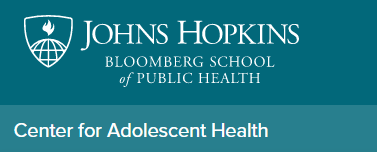Johns Hopkins University Center for Adolescent Health
Population of Focus: youth and adolescents in urban areas
Topic Areas: youth job training and mental health, tobacco use, alcohol use, substance abuse, violence, physical activity, and sexual health
Introduction, Mission, and Vision
The Johns Hopkins University Center for Adolescent Health (JHU PRC) is one of 26 Prevention Research Centers (PRCs) supported by the Centers for Disease Control and Prevention (CDC) for the 2019–2024 funding cycle. Each PRC is funded to establish and maintain their center and to conduct a core research project. PRCs may receive supplemental funding to conduct additional research projects and activities.
JHU PRC is committed to identifying ways to help young people living in urban areas lead healthy lives and become productive adults. It works with community partners to conduct research to identify the needs and strengths of young people, while also testing programs designed to promote their overall health and well-being.
JHU PRC also collaborates with community agencies in Baltimore to understand and reduce adolescent risk behaviors, such as tobacco and alcohol use, violence, and early sexual activity. To achieve its mission of promoting health equity and well-being for adolescents, JHU PRC collaborates with a network of young people in their communities and with academic partners on public health research, education, policy, and practice. These collaborations fuel their research and commitment to their community.
Core Research
Each PRC uses a community-engaged approach to conduct one primary applied public health prevention research project called a core research project. Project activities include design, development, implementation, evaluation, and dissemination. PRCs use at least 50% of their CDC funding to conduct the project in partnership with communities.
Promoting Healthy Paths to Work for Urban Youth: The Grads2Careers Model
JHU PRC’s core research project for the 2019–2024 funding cycle is conducted in partnership with the Mayor’s Office of Employment Development, Baltimore City Public Schools, and a citywide collaborative called Baltimore’s Promise. The Grads2Careers program helps recent high school graduates get jobs that pay a living wage. It provides career readiness training, occupational training, and other educational supports. It also provides tools to help reduce the trauma or chronic stress that can come from transitioning from high school to the working world.
The goal of this project is not only to reduce the high unemployment rate among young people in Baltimore, but also to increase how much they are paid and expand their employment options.
Additional Research
PRCs may receive supplemental funding to work on additional research projects each funding cycle. These Special Interest Projects (SIPs) focus on a variety of health topics or gaps in scientific evidence. PRCs can also conduct additional research as part of SIP Thematic Research Networks, which are groups of PRCs working together on related health topics.
PRC Vaccine Confidence Network (PRC VCN)
In April 2021, CDC funded a 12-month award to all 26 PRCs to form the PRC VCN in support of the agency’s Vaccinate with Confidence strategy for COVID-19. As part of this network, JHU PRC is examining vaccine hesitancy to find ways to promote vaccine confidence, increase vaccine uptake, and reduce disparities among Black families in Baltimore, Maryland. The goal is to reduce the incidence of COVID-19 in the United States.
JHU PRC’s strategy includes collecting data through an anonymous survey of Baltimore City Public School parents to get information on vaccine confidence and uptake. It will use the data collected to create a website for Black families that contains resources for people of all ages.
Nutrition and Obesity Policy Research and Evaluation Network (NOPREN) Collaborating Center
NOPREN seeks to improve nutrition and reduce obesity through policy research and evaluation. As part of this network, JHU PRC conducts mixed methods formative research to further develop the Baltimore Low Income Food Environment (BLIFE) model. The BLIFE model is a geospatially specific, agent-based model of how adolescents in urban low-income neighborhoods interact with the local food environment, including their homes and food outlets, schools, and recreation centers in the community.

Location: Baltimore, Maryland
Principal Investigator: Tamar Mendelson, PhD
Deputy Director: Beth Marshall, DrPH
Phone: 410-614-3953